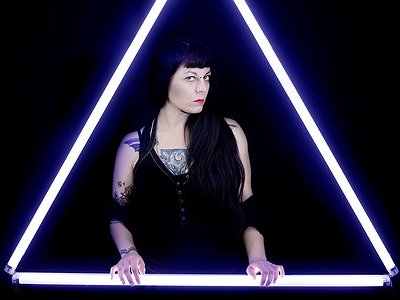Name: Suit Kei aka Alessandra Moroni
Occupation: Producer, DJ, founder Drastic Beat and Witches Are Back, an international transfeminist collective
Nationality: Italian
Current release: Suit Kei's remix of Yva & the Toy George 's "Teodora", as featured on the former's Stealth EP is available via Witches Are Back.
Recommendations: Music album: Death - Individual Thought Patterns; Book: Paramahansa Yogananda - Autobiography of a Yogi
If you enjoyed this interview with Suit Kei and would like to stay up to date on her work, visit her on Instagram, Facebook or the website of Witches Are Back.
When did you start DJing - and what or who were your early passions and influences? What was it about music and/or sound that drew you to it?
When I was a teenager I loved punk, psychedelic rock, heavy metal in its most brutal and technical forms, and more than everything, the gothic scene. Until I met illegal rave parties in 1998, and I discovered how techno felt.
I started DJing in 2001 at "Jungle Club", a historical place for goths, under the protective wing of Diego Dionisio. The first years were more like a way of having fun without pretending to be too serious, and it took some time to develop a real DJ technique. At that time, CDJs were an unreliable instrument and the only way to learn the real meaning of the word DJing, was to spend a considerable amount of hours learning how to handle vinyl records on turntables, touching them in the right way to be able to create a new sound through mixing.
It was a complicated and intense physical relationship that grew into an addiction.
For most artists, originality is preceded by a phase of learning and, often, emulating others. What was this like for you: How would you describe your own development as an artist and the transition towards your own voice?
I can say I always tried to express my own voice, to create something that was mine only, something original, different, to constantly introduce innovations. The transition was more in the consciousness of this. But it's a never ending process, because my way of expression changes under the constant influence of new impulses that come from external sources.
Of course, I had some very important masters that inspired me, and I will always be very grateful to them. I already mentioned Diego Dionisio but I cannot avoid crediting the immensity of Riccardo Petitti. A very important person for Rome and for the Italian scene, his party "Agatha" at Brancaleone (organized together with Andrea Lai) generated a chain reaction of inspirations and news that built a scene. He had musical culture with no end. I was spending a lot of time in his records shop for years and this changed my life. He's not in his human body anymore, but I think about his teachings everyday.
How do you feel your sense of identity influences your creativity?
Creativity is an evolutionary process. It expresses identity and transcends it, through mental processes, communication and sharing. Our identity is the way we perceive ourselves, and almost everything is contained within it: our emotions, our inspirations, our mental activity, our way of interacting with the world. But the spirit is not there, because it goes beyond our identity and perception.
The real, true emotion derived from making art, is like an enlightenment that comes when we transcend our identity and become art ourselves, touching the metaphysical plane of the spirit. It's really better than any drug on the market. Give it a try if you can!
What were your main creative challenges when starting out as a DJ and how have they changed over time?
In the first part of my "artistic career curve", creativity was never a challenge. I was living in an amazing city, at that time offering so many inputs and inspirations that everything was flowing very spontaneously in a continuous flux of emotions and liberation.
Being part of a militant underground art scene, I never built limits and borders around my creativity nor did I fix targets to be reached that were artistically challenging me. The real challenges were outside and more "environmental" ones.
Things changed many years later when I found myself an established reference for my scene and started questioning myself about what was next, feeling the first signs of pressure, realising that somebody was constantly expecting something from me, and that competition was a thing. I tried for the first time new music styles with an actual purpose. I opened my research to some point of view that people like me can consider, somehow, mainstream, to finally understand, some years later, that in the end I don't give a ****.
The biggest challenge for my creativity is actually the development of an increasing technical knowledge that allows me to express my inspiration freely.
As creative goals and technical abilities change, so does the need for different tools of expression, be it instruments, software tools or recording equipment. Can you describe this path for you, starting from your first studio/first instrument? What motivated some of the choices you made in terms of instruments/tools/equipment over the years?
So, as I just said a few lines ago, technical knowledge is for me the biggest challenge. It is an ocean with no end.
Upon my first active impact with music, I studied theory, solfeggio and tried my hand at some instruments like keyboard and bass guitar. I remember with a lot of tenderness my first DJ equipment. The very early age setup was trying to mix with a turntable and a tape deck. I already had some instruments, PA and audio equipment available but no DJ console.
Once this rudimentary phase was over I bought a couple of used, non-technics, belt-driven, prehistoric BST turntables and a minimalistic Gemini DJ mixer.
After learning how to dominate this crazy horse, actually a very hard training, I had the chance to use Technics 1200 regularly (the one and only real DJ turntables) and discovered I was doing great. That was the point when the real addiction started. No coming back.
Parallel to this, but with a slower development, the Music production path. From the early versions of Fruity Loops and Reason (music production software) with HiFi speakers, to Ableton Live and analog synthesisers in a real studio with an acoustic treatment, pleasure and addiction are, most probably, a motor of evolution.
Have there been technologies or instruments which have profoundly changed or even questioned the way you perform?
As a DJ I was always loyal to the only way I consider real DJing: a couple of Technics 1200 turntables (or, rather, the more the better!), tons of vinyl and a good professional DJ mixer.
Scratch Live or Serato may be a good compromise to feel the physical contact and at the same time avoid bringing around heavy bags and risking destroying pieces of a collection (my fetishism and my back are thankful for this technology). Also the inferior cost of digital tracks, compared to vinyl, makes them attractive.
Another, sad but true, factor to consider, is the decreasing quality of maintenance, servicing, and consideration that club owners and event managers have for vinyl and turntables. The increasing use of digital formats and devices, left many poor old Technics turntables in a state of abandonment. Consequently, they can be often be broken, not working, with flaws. A DJ performance in these conditions can be very tricky, if not impossible. It's delicate work.
I have only come to accept using CDJs since a couple of years. The comfort is no matter of discussion. You arrive at the club with headphones and a couple of tiny USB sticks, and surrender yourself to the future. But, hey, no. It does not properly ignite the spark for me. And, no, I don't use Record Box (universally used software for CDJs) and of course NO SYNC, or die.
Call me old-fashioned but I find it's too much technological intervention and a step towards the "automatic DJ-A.I." that will, one day, be used instead of Instagram phenomenons to rock lobotomised crowds.
The right compromise between my mental and physical wellness and the world outside is to use vinyl and CDJs together, in a variable percentage depending on various conditions, keeping in mind that if I can, vinyl only is, always, my thing.
DJing is a unique discipline at the border between presenting great music and creating something new with it, between composition and improvisation. How would you describe your approach to it? What do you start with, how do you develop a set, how does a form gradually manifest itself, what are good transitions between different tracks etc …
The use of vinyl, the physical touch to play / stop / skip / adjust, the beatmatching by ear are for me, as you may guess from my previous answers, a very important factor that concretely makes the difference in the way of approaching, executing and interpreting a real DJ performance.
Other factors that I consider very fundamental are the EQ cuts and fader curve of the DJ mixer. I love to work a lot on the EQ and the gradual progression of volumes in order to create something new from mixed tracks.
I'm not a big fan of built-in mixer FX, I prefer to create natural raw effects with eq and mixing. I never program my set before a gig: no improvisation, no fun. Of course I select a decent amount of tracks to be used for the situation. But the tracks come spontaneously in the mix one after another. In the best ecstatic performance state of grace, I see rhythm and frequencies as colours and shapes that I can use to paint a new beautiful picture.



